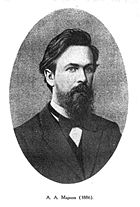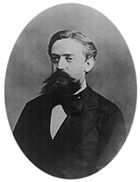- Andrey Markov
-
Andrei Andrejewitsch Markow (russisch Андрей Андреевич Марков, wiss. Transliteration Andrej Andreevič Markov, früher auch als Markoff transkribiert; * 2./14. Juni 1856 in Rjasan; † 20. Juli 1922 in Petrograd) war ein russischer Mathematiker, der wesentliche Beiträge zur Wahrscheinlichkeitstheorie und Analysis beisteuerte.
Leben
Markow wurde in Rjasan geboren. Er studierte 1874–1880 unter Pafnuti Tschebyschow in Sankt Petersburg. 1885 verteidigte er seine Habilitationsschrift Über einige Anwendungen algebraischer Kettenbrüche und wurde in der Folge 1886 außerordentlicher Professor an der Fakultät für Mathematik und Physik der kaiserlichen Universität Sankt Petersburg. Im gleichen Jahr wurde er Mitglied der Russischen Akademie der Wissenschaften.
Werk
Markow ist vor allem für die Theorie der stochastischen Prozesse bekannt: Er berechnete 1913 die Buchstabensequenzen in russischer Literatur, um die Notwendigkeit der Unabhängigkeit für das Gesetz der großen Zahlen nachzuweisen. Die Berechnungen konnten zudem als Aussage über die Wohlgeformtheit der Orthographie von Buchstabenketten interpretiert werden. Aus diesem Ansatz entwickelte sich ein allgemeines statistisches Werkzeug, der sogenannte stochastische Markow-Prozess, aus dem sich zukünftige Entwicklungen auf Grundlage des gegenwärtigen Wissens bestimmen lassen. Heute findet sich z. B. eine Anwendung sogenannter Hidden Markov Models in der Spracherkennungssoftware. Nach Markow sind u. a. die Markow-Ketten und die Markow-Ungleichungen benannt.
Weblinks
- Literatur von und über Andrei Andrejewitsch Markow im Katalog der Deutschen Nationalbibliothek
- Markov und die Folgen - Projekt an der Humboldt-Universität zu Berlin
- Philipp von Hilgers, Wladimir Velminski (Hg.): Andrej A. Markov. Berechenbare Künste, Zürich/Berlin: diaphanes, 2007. ISBN 978-3-935300-69-8
- A. A. Markoff: Wahrscheinlichkeitsrechnung (2. Auflage, 1912) Volltext: Cornell University Library
- Andrei Andrejewitsch Markow im MacTutor History of Mathematics archive (englisch)
Personendaten NAME Markow, Andrei Andrejewitsch KURZBESCHREIBUNG russischer Mathematiker GEBURTSDATUM 14. Juni 1856 GEBURTSORT Rjasan STERBEDATUM 20. Juli 1922 STERBEORT Petrograd
Wikimedia Foundation.


